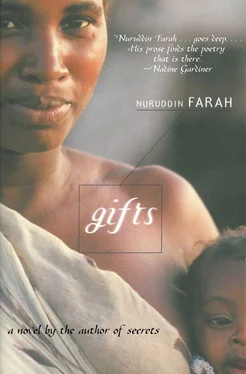Nuruddin Farah - Gifts
Здесь есть возможность читать онлайн «Nuruddin Farah - Gifts» весь текст электронной книги совершенно бесплатно (целиком полную версию без сокращений). В некоторых случаях можно слушать аудио, скачать через торрент в формате fb2 и присутствует краткое содержание. Год выпуска: 2011, Издательство: Arcade Publishing, Жанр: Современная проза, на английском языке. Описание произведения, (предисловие) а так же отзывы посетителей доступны на портале библиотеки ЛибКат.
- Название:Gifts
- Автор:
- Издательство:Arcade Publishing
- Жанр:
- Год:2011
- ISBN:нет данных
- Рейтинг книги:3 / 5. Голосов: 1
-
Избранное:Добавить в избранное
- Отзывы:
-
Ваша оценка:
- 60
- 1
- 2
- 3
- 4
- 5
Gifts: краткое содержание, описание и аннотация
Предлагаем к чтению аннотацию, описание, краткое содержание или предисловие (зависит от того, что написал сам автор книги «Gifts»). Если вы не нашли необходимую информацию о книге — напишите в комментариях, мы постараемся отыскать её.
Gifts — читать онлайн бесплатно полную книгу (весь текст) целиком
Ниже представлен текст книги, разбитый по страницам. Система сохранения места последней прочитанной страницы, позволяет с удобством читать онлайн бесплатно книгу «Gifts», без необходимости каждый раз заново искать на чём Вы остановились. Поставьте закладку, и сможете в любой момент перейти на страницу, на которой закончили чтение.
Интервал:
Закладка:
“The sea,” he said, “my love.”
She thought of Bosaaso, but didn’t say anything.
“I can smell it,” Abshir said.
Then his face was marked with gridded lines forming a smile. Did love reside in the odour of one? as Abshir had put it. Remembering the Italian film Profumo di Donna, Duniya was able to review her life between the blinking of an eye. Then she asked herself whether we wear perfumes to supplement or suppress natural body odours that betray our emotions.
Abshir parked opposite what had once been a fish market. The old post office was somewhere in the vicinity, he remembered. They walked up some steps, and turned left, and then down cobblestones eighty-odd years old, towards the ocean. They touched, they held hands as they strode together, silent.
They stood by the railing, which careless drivers had collided with a great many times, but which had never given way. She reminded herself to be careful: life was a driving-seat and accidents were blind curves, ambushing one. She cheered up, telling herself that dinner-time wasn’t that far off and they would all be there, Bosaaso included.
Abshir said, “But you haven’t told me how you’ve been?” And he lit a cigarette.
“It has been a long journey up and up and up, here,” Duniya said, “here, here I am, that is,” a pause as if to emphasize a point, “and there, down below, feels like way, way down, and the two stations are separated by a wide gulf, and I am senseless with giddiness whenever I examine how far up I have come, thanks to you, Abshir.”
“Come, come,” he said embarrassed, and wiped his face with a handkerchief. Silent, he waited. She went on, encouraged by his silence. “To know how I am and how I have fared, you must understand why I resist all kinds of domination, including that of being given something. As my epitaph I would like to have the following written: ‘Here lies Duniya who distrusted givers’.”
“I’ll say something, if I may,” said Abshir.
Duniya nodded.
“You are a woman and younger than me,” said Abshir, “I suppose these facts are central to our gift relationship, yours and mine.”
“And you give because you’re guilty?”
He answered in a round-about way, “If you were a boy, you wouldn’t have been married off to a man as old as your grandfather in the first place, and in the second, you might have got a scholarship to a university of your choice, because you were brilliant and ambitious. An injustice had been done. It has been my intention to right the wrong as best I could. I am sorry.”
He indicated that he was ready to go back. It took them a very short time to agree that they should first go to her place and drop her off. He would return to the flat in the city, shower and change, and then come to fetch them himself in Bosaaso’s car to go together to Croce del Sud for dinner.
Then they had time to talk about Gisela, Abshir’s wife, and the two daughters, Madalena and Annalisa. It was no secret that both girls hated Somalis, to whom they were rude on the phone. On occasion, they would even close the door in a caller’s face. But they had welcomed Duniya, when she had visited them, and they got on well. All the same Abshir couldn’t help mentioning his family’s growing suspicion that he was planning to buy property; and when they learnt that he had taken a few thousand dollars out of his bank account “as though he would acquire the whole country in one single stroke,” his daughters wept for hours on end and peace was made between them only when he promised he was returning to Rome after he had paid a visit to Duniya and their cousins.
“Are you buying property then?” she asked.
“A pied-a-terre, to begin with, in which to house you,” he said, “and you are free to live in it until you’ve sorted out your situation. A pied-a-terre small enough for the children to stay in if they choose not to share a house with you and Bosaaso if you happen to marry. And for me to stay in if I visit.”
“Too many ifs,” she said.
“You’re a pile of ifs and maybes, if you’ll pardon me,” Abshir said.
“Of course,” she said.
Then answering a general question about Bosaaso and herself, Duniya reviewed her own story from the moment it began telling itself, omitting not a single significant detail. Soon after she had finished telling her tale, they reached her place.
He said, “There is no going back, only forward.”
“Let’s hope so,” she said.
By general consent, Mire was seated at the head of a table known to the management of the Croce del Sud as “Sette,” which in their jargon meant the table could seat seven. It had only one end, the other having been pushed against the wall. So three people occupied either side of it, and Mire its only head. Bosaaso had booked the table and arrived earlier than the others, being an anxious type, the kind of man who got to the airport half an hour before the airline people thought necessary. The waiters had set the table under his supervision. While waiting for the other guests to arrive, he had had two long drinks of a fruit concoction, and not a drop of liquor.
Then Duniya and her entourage arrived, all five of them. And before their greeting noises had died down, Mire made his entrance. They all hushed, to let Mire and Abshir greet each other, properly and in total comfort. Duniya saw Mire’s eyes burn like a curtain ablaze as she shook with passion Abshir’s hand and then hugged him.
A couple of waiters arrived to lead them to their table. People’s heads turned to watch them walk past. Duniya had been dressed by Nasiiba in a plain-cut but very attractive print dress, which her favourite seamstress had tailored for an occasion such as this. As Nasiiba had suggested, she wore her hair uncovered, in a bun, making her look almost as tall as Mire, who was a considerable height whilst standing among women. Nasiiba was in a baggy dress, fashionable at the time, and like Yarey, she had on something Abshir had brought them from Italy. The men, all four of them, had changed into something less fancy, no dinner jackets, no ties, in short, nothing quite as impressive as the women’s. Duniya’s dress didn’t feel tight either at the waist or the armpits.
They were all clearly happy to be together and to talk to one another.
Duniya and Bosaaso were the centre-pieces of the gathering, not Abshir. Everyone could see that.
The waiters wouldn’t leave until everyone, male and female, young and old, was seated. Bosaaso’s eyes turned to Duniya for guidance. Yarey was placed between Duniya and Uncle Abshir, whereas Bosaaso was made to take the chair facing Duniya with Nasiiba sitting next to him, and Mataan opposite Uncle Abshir.
Dispensing with the formality of menus, Mire asked the waiters what they had. There was no point in whetting appetites with a dish listed on the menu but which was most likely not available. They listened to the waiters give a recitation of the dishes that were to be had, providing explanations to queries coming from Yarey, Nasiiba or a gentle “What’s that, Uncle?” from Mataan. Being themselves semi-literate, the waiters were no doubt content to take the orders verbally.
Then a waiter of the older generation, who had worked in Croce del Sud when the Italians were still the master race of Mogadiscio, came, not to serve or take their order, but to pay his respects to Dr Mire who had been his wife’s doctor. The waiter was of the River People, with a broad, handsome smile, very smooth skin, growing not a single hair on his chin or upper lip. He half-bowed deferentially towards Duniya and his large eyes make a quick survey of Sette and decided he would take over. He dismissed the two younger waiters with a friendly gesture, and he went round making sure the forks and knives were in their proper places. He apologized again and again, charming Duniya, who placed herself in his experienced hands, as it were, out of which she didn’t mind eating.
Читать дальшеИнтервал:
Закладка:
Похожие книги на «Gifts»
Представляем Вашему вниманию похожие книги на «Gifts» списком для выбора. Мы отобрали схожую по названию и смыслу литературу в надежде предоставить читателям больше вариантов отыскать новые, интересные, ещё непрочитанные произведения.
Обсуждение, отзывы о книге «Gifts» и просто собственные мнения читателей. Оставьте ваши комментарии, напишите, что Вы думаете о произведении, его смысле или главных героях. Укажите что конкретно понравилось, а что нет, и почему Вы так считаете.











